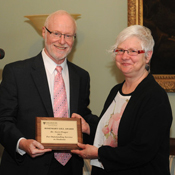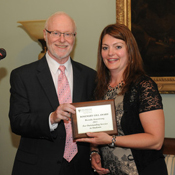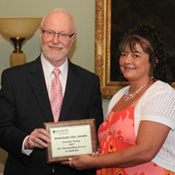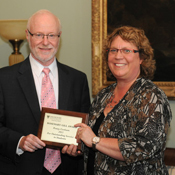If you ask them, they’d tell you it’s all in a day’s work. But the students they support know better — it's a lot more than that.
Brenda Armstrong, Penny Corkum, Gerri Frager and Carolyn Young are this year’s recipients of the Rosemary Gill Award, presented to faculty or staff who have provided outstanding service to students in a non-teaching capacity.
Established in 1995, the award is dedicated to the memory Dr. Rosemary Gill, a former director of University Health Services. At last week’s ceremony, Dal President Tom Traves called it the “going the extra mile” award.
“It’s an opportunity to bring forward some colleagues who are genuinely deserving of our praise and our admiration because of the terrific difference they make at our institution and in the lives of our students,” said Dr. Traves.
There when students need them
Two of this year’s recipients are from the Faculty of Medicine: Dr. Gerri Frager, professor in Pediatrics and director of the Medical Humanities program, and Brenda Armstrong, administrative secretary in the Department of Medical Neuroscience (formerly known as the Department of Anatomy and Neurobiology).
 Dr. Frager, who is also medical director of Pediatric Palliative Care Service at the IWK Health Centre, is responsible for HEALS — “Healing & Education through the Arts and Life-Skills.” The program, part of the Division of Medical Education, supports the use of the arts to enhance learning among medical students, with programs in the visual and performing arts, in creative writing, the history of medicine and life skills.
Dr. Frager, who is also medical director of Pediatric Palliative Care Service at the IWK Health Centre, is responsible for HEALS — “Healing & Education through the Arts and Life-Skills.” The program, part of the Division of Medical Education, supports the use of the arts to enhance learning among medical students, with programs in the visual and performing arts, in creative writing, the history of medicine and life skills.
“It’s really a tribute to the students,” said Dr. Frager. “The calibre of students we have at pilipiliÂţ» makes my job super easy, as well as the colleagues and people that I work with. It’s a relatively easy responsibility to be able to provide the kinds of service that I do in the course of my work because of those students and the colleagues I have the opportunity to work with.”
One of the students who nominated Dr. Frager cited her work on Ed’s Story - The Dragon Chronicles, a play she produced based on the journal writings of Ed, a 16-year-old with advanced cancer. The project, which began as a clinical care exercise before being performed locally and on the road, is now being integrated within the second-year medical curriculum as a teaching tool.
“Gerri is gracious, industrious and patient,” wrote the nominator. “She puts students and our ideas first. She has given us opportunities to learn, grow, make mistakes and develop into sensitive and caring physicians.”
 Armstrong is responsible for the Human Body Donation and Teaching programs in the Department of Medical Neuroscience. One of her responsibilities is supporting ANAT1010, the Basic Human Anatomy class, which has grown to include more than 600 students a year since adding a distance component in the mid-1990s. Writes one of her peers, “The pilipiliÂţ» of this course is almost entirely dependent on the front line work provided by Brenda in dealing with endless student enquiries and issues with enrolment, assignments and exams.”
Armstrong is responsible for the Human Body Donation and Teaching programs in the Department of Medical Neuroscience. One of her responsibilities is supporting ANAT1010, the Basic Human Anatomy class, which has grown to include more than 600 students a year since adding a distance component in the mid-1990s. Writes one of her peers, “The pilipiliÂţ» of this course is almost entirely dependent on the front line work provided by Brenda in dealing with endless student enquiries and issues with enrolment, assignments and exams.”
Armstrong also works to help students from both Medicine and Dentistry who take part in the department’s summer prosection program, and she also supports families who are interested in donating the bodies of their loved ones to Dal’s Human Body program, improving the education of the next generation of medical students.
“I just enjoy doing what I do,” said Armstrong, who has been with the department more than 25 years. “I guess it just comes back around, the joy working with the students and everyone. I just want to thank everybody.”
Making things happen
The other recipients of this year’s Rosemary Gill Awards came from the Faculty of Science: Dr. Penny Corkum, director of clinical training for Dal’s Clinical Psychology program, and Carolyn Young, administrative assistant in the Department of Biology.
 Young has been with Biology for more than 25 years. She arranges exams and thesis defences for more than 100 graduate students and organizes SEASIDE, a set of special elective classes for students in Biology, Marine Biology and Environmental Science. The limited enrolment program, open to students inside and outside of Dal, means answering questions and processing applications for close to 200 students.
Young has been with Biology for more than 25 years. She arranges exams and thesis defences for more than 100 graduate students and organizes SEASIDE, a set of special elective classes for students in Biology, Marine Biology and Environmental Science. The limited enrolment program, open to students inside and outside of Dal, means answering questions and processing applications for close to 200 students.
Wrote one PhD candidate, “Graduate students often come to Carolyn in times of stress, when something comes up unexpectedly, and often when there are tight deadlines. She always exhibits a kind manner and professionalism that is comforting to students and she makes you feel that she will do everything she can to make things happen.”
“It’s an honour, a true honour,” said Young. “It’s challenging [work] at times, but very rewarding to see them graduate. [I hope my work] takes some of the administrative burden off them so they can focus on their studies.”
 Dr. Corkum has been a faculty member at Dal for 10 years, with research focusing on pediatric sleep. In her capacity as director of clinical training, she led the Clinical Psychology PhD program through a pilipiliÂţ»ful re-accreditation in 2008 and has provided students with more opportunities to offer feedback on improving the program. A key part of this is a monthly review meeting known casually as “Bites and Gripes.”
Dr. Corkum has been a faculty member at Dal for 10 years, with research focusing on pediatric sleep. In her capacity as director of clinical training, she led the Clinical Psychology PhD program through a pilipiliÂţ»ful re-accreditation in 2008 and has provided students with more opportunities to offer feedback on improving the program. A key part of this is a monthly review meeting known casually as “Bites and Gripes.”
Wrote two of her graduate students: “Dr. Corkum takes immense pride in both the program and in its students. Her dedication to ensuring the standards and quality of the program are upheld is often done largely behind the scenes but is critical to the pilipiliÂţ» of the students.”
“I think it's wonderful to have a job where you get to do all the things that you truly love to do,” said Dr. Corkum. “Research is important to me, clinical work is important, but supporting students is why we’re here, so this is a really special award.”

